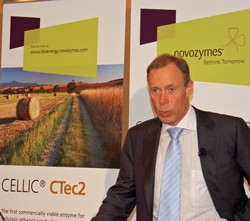2010 National Ethanol Conference Photo Album
 A major breakthrough in the development of cellulosic ethanol was announced at the National Ethanol Conference in Orlando Tuesday.
A major breakthrough in the development of cellulosic ethanol was announced at the National Ethanol Conference in Orlando Tuesday.
Novozymes launched the first commercially viable enzymes for production of biofuel from agricultural waste – Cellic® CTec2.
“We have been working on this for the past 10 years and promised our customers and the market to be ready by 2010,” says Novozymes’ CEO, Steen Riisgaard, who first started work on the project 30 years ago as a young researcher.
He says they are really focusing on using this new development on making ethanol from agricultural waste, such as wheat straw or corn cobs, to avoid the current controversy of indirect land use change. “Personally, I think energy crop are wonderful and should be part of our future, but I don’t want to see this beautiful development be blocked by people speculating about things,” he said.
Riisgaard gives lots of credit to the United States for moving toward renewable energy sources. “Other than Brazil, the US is certainly in the lead,” he said. “Corn based ethanol has paved the way in terms of establishing the infrastructure and it appears to us on the other side of the Atlantic to be a carefully orchestrated and well-executed plan.” But he stresses the importance of continued investment by both the public and private sectors to make cellulosic ethanol commercially viable.
Novozymes is in the process of contracting a plant in Blair, Nebraska to produce the enzymes. “It will be ready for production by the end of 2011 and will produce enzymes for both corn based and cellulosic ethanol,” he said.
Listen to or download my interview with Steen Riisgaard here:

